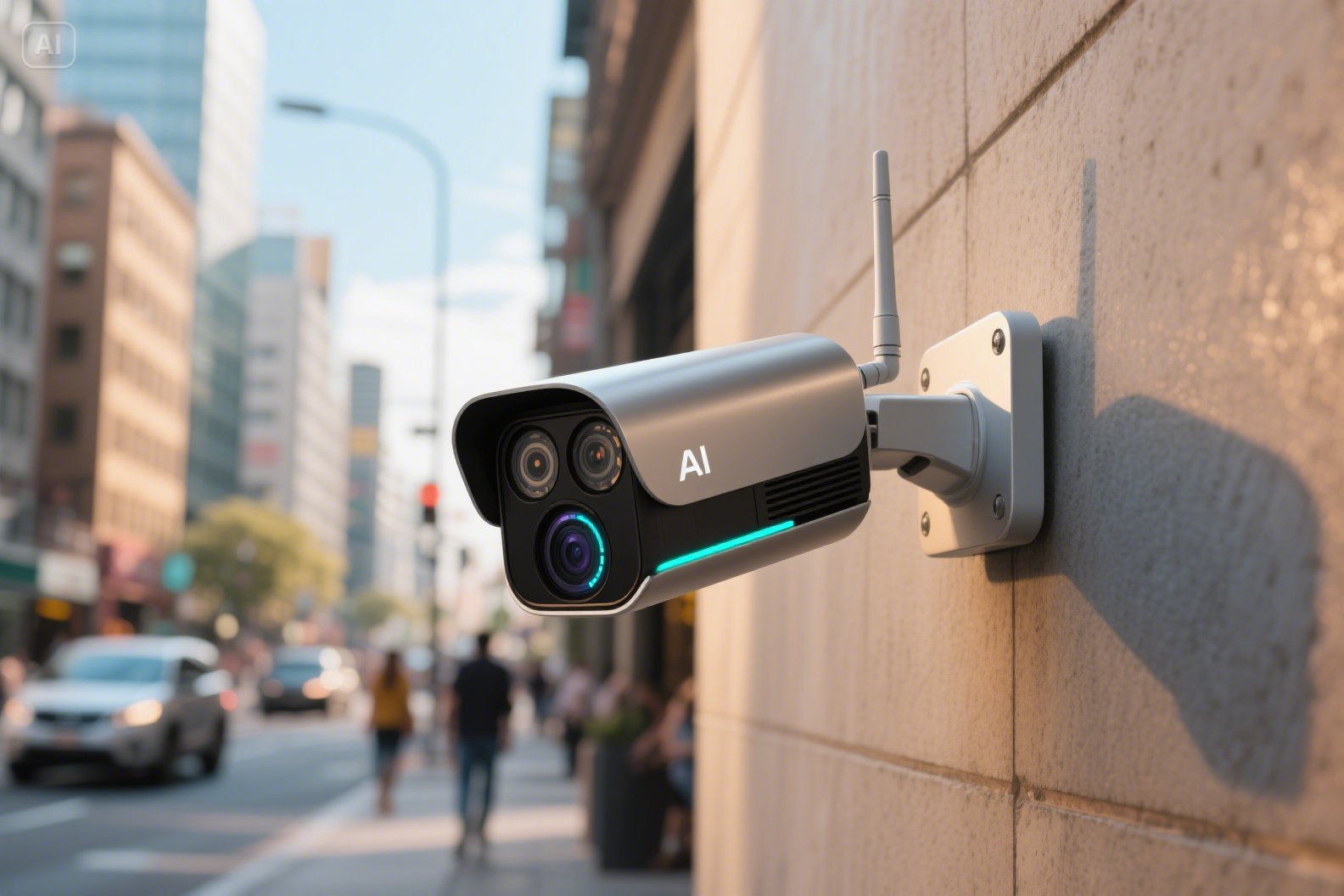
What Is an Artificial Intelligence (AI) Camera?
An AI Camera is a conventional camera enhanced with artificial intelligence technologies. Unlike traditional cameras that simply stream video, AI Cameras process and analyze footage in real time—detecting motion, identifying faces, recognizing objects, and even tracking behavior. Powered by deep learning and computer vision, these cameras are revolutionizing how surveillance and analytics are done.
How AI Camera Systems Work
AI Camera systems integrate hardware and advanced algorithms to function smartly:
-
Image Capture Hardware – High-resolution lenses with infrared/night‑vision capabilities.
-
On‑Device AI Processor – Often embedded with specialized chips or powered via connected servers.
-
Computer Vision & Deep Learning Models – Trained on massive datasets to recognize people, vehicles, actions.
-
Alerts & Analytics Engine – Sends alerts for unusual events like loitering, unauthorized access, or abnormal crowd formation.
-
Integration & Storage – Stores metadata and video in the cloud or edge devices, allowing seamless search and retrieval.
These systems reduce false alarms and deliver higher precision—boosting safety and operational efficiency.
Why Choose an AI‑Powered CCTV Surveillance Solution in Bangladesh?
In bustling urban environments like Dhaka, efficient and accurate video surveillance is critical. AI Cameras offer significant advantage:
-
Smart Alerting: Detects human intrusion while ignoring swaying trees or lighting changes.
-
Multiple Use Cases: From traffic enforcement and crowd control to business analytics.
-
Scalability: Easily cover large zones without adding human monitors.
-
Localization: Customizable for regional norms—language, appearance, context.
-
Cost‑Efficiency: Lowers operating costs by minimizing manpower and wasted storage.
These factors make AI‑Powered CCTV Surveillance Solutions in Bangladesh a reliable and future‑ready choice.
AI Camera Price in Bangladesh: What to Expect
Pricing depends on features and complexity:
-
Basic AI Cameras: ৳10,000–15,000 (basic motion and object detection).
-
Mid‑Tier Options: ৳20,000–35,000 (night vision, higher resolution, smart tracking).
-
Enterprise/Server‑Based Systems: ৳50,000+ (multi-camera analytics, advanced recognition, integration).
Ultimately, price scales with resolution, object detection range, AI accuracy, integration compatibility, and after-sales service.
Top Features of Modern AI Camera Systems
Advanced Face Recognition
Identifies individuals real-time, alerts when matching white or blacklist.\
Vehicle Plate & Color Recognition
Detects license plates—useful for parking, tolling, and border control.
Behavior Detection
Spot fights, loitering, fallen persons; proactive safety response.
Crowd Analytics
Estimate crowd size and density key for malls, stations, event venues.
Tamper‑Proof Monitoring
Detects lens obstruction, angle changes, and sabotaging attempts.
All these grow in accuracy thanks to machine learning and continuous retraining.
Benefits for Different Sectors
Commercial & Retail
-
Shoplifting alert, foot traffic mapping, queue analytics.
-
Personalized marketing via visitor behavior and patterns.
Industrial & Warehousing
-
Ensure safety quantity compliance; monitor PPE use and accident detection.
Government & Smart Cities
-
Traffic congestion alerts, illegal parking detection, public safety enforcement.
Residential Communities
-
Gated community monitoring through face/vehicle recognition and no-entry alerts.
Comparing Traditional CCTV and AI Camera Systems
|
Feature |
Traditional CCTV |
AI Camera System |
|
Detection |
Motion-only |
Behavior, object, face, plate |
|
Monitoring |
Needs human supervision |
Auto-alerts, reduced manpower |
|
Video Analytics |
Manual search |
Smart search via metadata |
|
False Alarms |
High (weather, pets) |
Low (AI filters noise) |
|
Data Utilization |
Limited |
Actionable business and safety insight |
|
Integration Capability |
Standalone |
ERP, access control, smart city APIs |
Implementation Strategy for AI Camera Roll‑Out
-
Needs Assessment – Define objectives: safety, analytics, compliance.
-
Technical Design – Choose resolution, field of view, night‑vision, storage.
-
Pilot Phase – Deploy small camera set to test algorithms and alerts.
-
Scale‑Up – Expand installation, refine workflows, train staff.
-
Ongoing Maintenance – Update models, calibrate cameras, secure data.
Meet GCTL: Your Trusted AI Camera Provider in Bangladesh
GCTL stands as a premier CCTV Camera importer, supplier, and provider based in Bangladesh. Specializing in AI-enhanced solutions, GCTL offers:
-
Wide range of AI Camera Systems
-
Reliable after-sales support
-
Custom solutions tailored for local needs
-
Cost‑effective pricing and service packages
Whether you’re a small business or government institution, GCTL equips you with advanced AI surveillance for stronger protection and insights.
Conclusion
Frequently Asked Questions (FAQs)
1. What is the difference between an AI Camera and a regular CCTV?
A regular CCTV records and stores video. An AI Camera analyzes in real-time—detecting faces, objects, behaviors, and issuing smart alerts—enhancing both security and insights.
2. How reliable are AI Cameras in Bangladesh’s climate?
Modern AI cameras are built ruggedly—weatherproofed to endure heat, humidity, and rain. With correct installation and calibration, they provide high reliability in Bangladesh’s climate.
3. Can I integrate AI Cameras with existing systems?
Yes! Most AI Cameras support integrations with access control, alarm systems, ERP, and smart city platforms via API or SDK.
4. Do these systems infringe privacy?
They must comply with local privacy laws. Responsible providers like GCTL implement data encryption, secure storage, and provide customization for region-specific requirements.
5. What kind of maintenance do AI Cameras need?
Routine checks (lens cleaning, firmware updates, model retraining) ensure optimal performance. GCTL offers support and maintenance packages.
6. Why is AI Camera price higher than traditional cameras?
AI cameras justify the cost with advanced hardware, onboard processors, proprietary AI models, and reduced manual monitoring, delivering substantial value over time.
